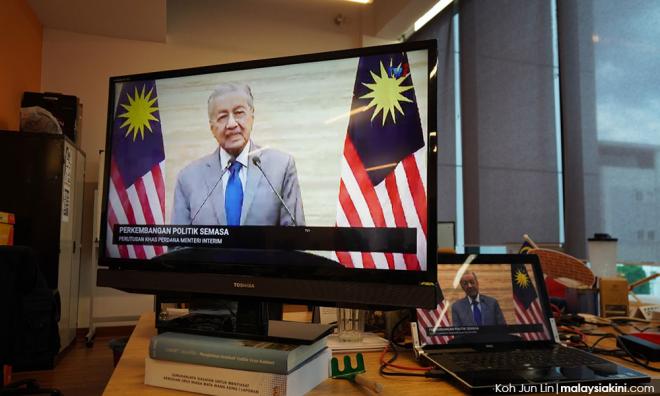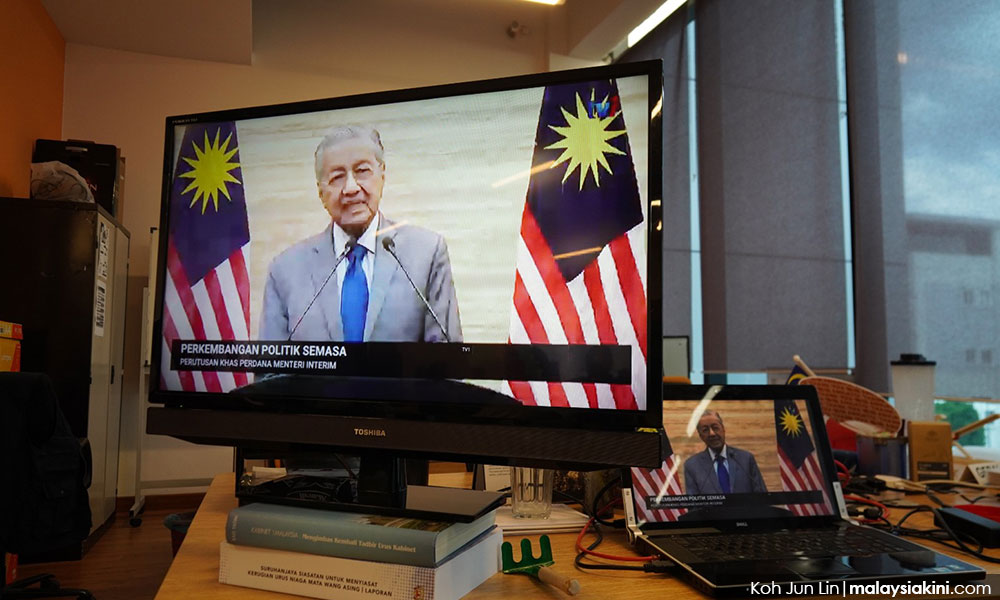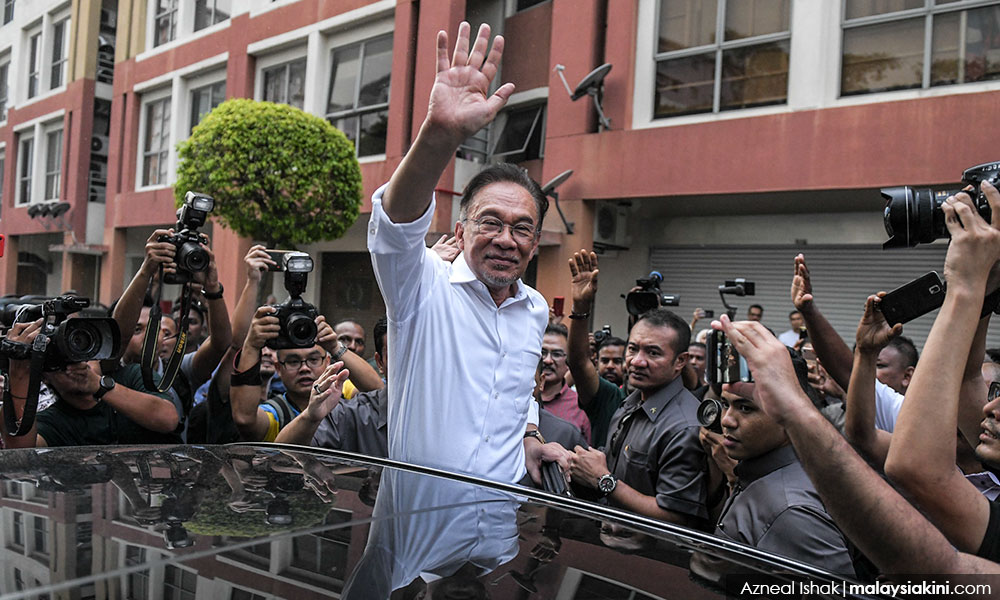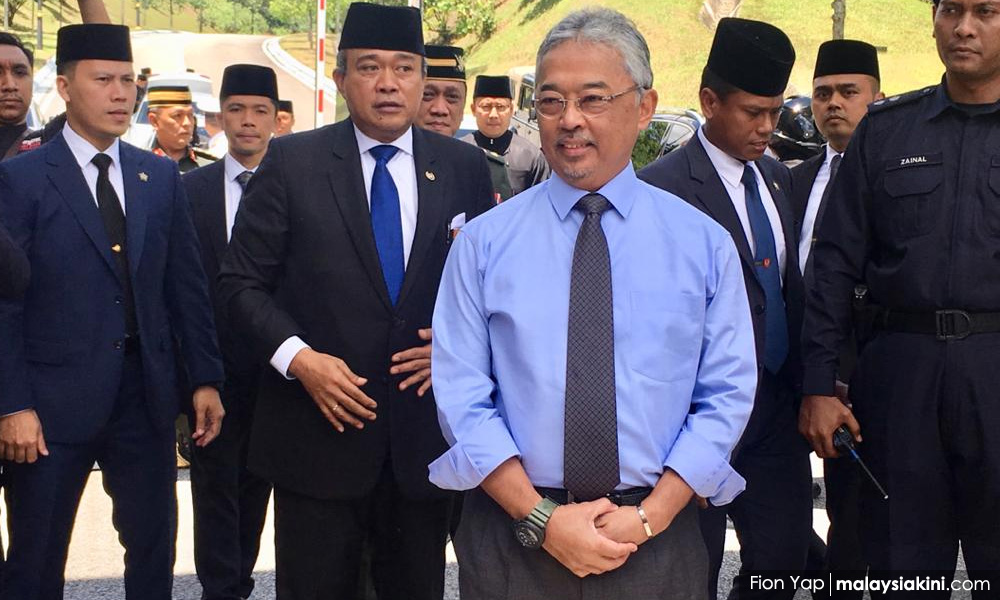
After interim prime minister Dr Mahathir Mohamad stepped off the podium following his nationally televised address this evening, it became apparent that the "Sheraton Move" has had reverberating effects that went beyond the demise of the Pakatan Harapan government.
It had upended the conventional two-coalition political configuration in the country, fracturing Malaysian politics into three groups.
The "Sheraton Move" refers to the gathering of 11 rogue PKR MPs led by Gombak MP Azmin Ali with Bersatu, BN, PAS, GPS and Warisan at Sheraton Hotel, Petaling Jaya last Sunday night after a day-long of political manoeuvres to oust the Harapan government and replace it with a new coalition dubbed "Perikatan Nasional".

Mahathir, who had remained quiet since the "Sheraton Move", broke his silence in the televised address, explaining that he did not agree with the action of his party Bersatu and the 11 PKR defectors whom he said contributed to the collapse of the Harapan government.
The Langkawi MP, who resigned as prime minister following the political manoeuvring, explained that he cannot accept working with Umno.
But the most contentious part of his speech was his intention to set a new government that does not follow party lines.
"I believe, right or wrong, politics and political parties must be set aside for now. If I am allowed, I will try to form an administration that doesn't side with any party. Only national interests will be prioritised," Mahathir said.
BN and PAS yesterday hinted of Mahathir's intentions when they announced that they will no longer support him as the prime minister candidate.
Mahathir's unanimous support evaporates
After learning of his objectives, both BN and PAS, which initially publicly backed Mahathir, decided to ask the Yang Di-Pertuan Agong to dissolve Parliament instead of nominating him as prime minister.
Likewise, Harapan, which had hoped Mahathir would restore the previous Harapan government, ended up nominating PKR president Anwar Ibrahim as prime minister. This comes after learning about how Mahathir planned to move forward and despite publicly declaring support for Mahathir earlier.

"Mahathir will decide who will be the cabinet ministers. DAP and other political parties will not be consulted in the process," said DAP's Bukit Gelugor MP Ramkarpal Singh.
"Effectively, it is a Mahathir government and not a Harapan government. The promises of the Harapan manifesto will not be fulfilled," added the lawyer.
In short, what Mahathir desired is similar to a presidential system where the president, after being elected, has absolute discretion at choosing members of the administration.
But the concept is alien to Malaysia's Westminster system where the component parties in the ruling coalition have a significant say in decisions and breaking ranks could risk fracturing the parties.
In four days, Mahathir went from commanding unanimous support in the Dewan Rakyat to having less than a third of the MPs.
From the onset, the support for Mahathir by MPs from both sides of the political divide was out of political expediency, as both proponents of Harapan and Perikatan Nasional had hoped that the interim prime minister will side with them.
But after learning that Mahathir wouldn't side with either, they started to abandon him.
Following these developments, the political configuration is now divided into three main blocs — Mahathir's Unity bloc, the Harapan bloc and the BN-PAS bloc.
The three factions explained
Mahathir's Unity bloc, as of tonight, commands at most 64 MPs in the 222-member Dewan Rakyat.
Despite Mahathir's anger at Bersatu for trying to form a coalition with Umno, its 25 MPs today reiterated their support for him. Counting Mahathir, Bersatu has 26 MPs.
The 11 PKR defectors led by Gombak MP Azmin Ali, having failed in their "Perikatan Nasional" plan after BN and PAS pulled out, is now aligning with Mahathir's new non-political government proposal.
GPS (18 MPs) and Warisan (nine MPs) have previously voiced their support for Mahathir but their loyalty may not last after learning about the stalwart's unconventional idea.
GPS, which had yesterday declared support for Mahathir, today issued another statement that it will act "in the interest of the nation without sacrificing the rights and interest of Sarawak" but made no mention of any names.
Meanwhile, the BN-PAS bloc, also known as Muafakat Nasional, commands 61 MPs comprising Umno (39), PAS (18), MCA (2), MIC (1) and PBRS (1).
The largest grouping is the Harapan bloc, which controls 92 MPs. They comprise DAP (42), PKR (39) and Amanah (11). This is after PKR lost the 11 MPs to defections.
Despite being the largest bloc, it is still far short of the 112 seats needed for a majority in the Dewan Rakyat.
There are also five other MPs from Star (1), PBS (1), Upko (1), Parti Bersatu Sarawak (1) and an independent.
Breaking the impasse
For now, the ball is back in the court of the Istana Negara. The Yang Di-Pertuan Agong today finished interviewing most of the 222 MPs on their preferences.

By convention, the king can invite the candidate with the most nominations — in this case, Harapan's Anwar — to try and form a workable majority coalition.
If a majority government cannot be formed, the bloc with the most MPs can form a minority government.
Alternatively, the Agong can decide to dissolve the House to pave the way for fresh elections.
On the fourth day of the political imbroglio triggered by the "Sheraton Move", Malaysia is no closer to political clarity or a new government.
However, in the next hours and days, this three-cornered configuration could quickly change as parties may switch sides in a bid to become "kingmaker". - Mkini



No comments:
Post a Comment
Note: Only a member of this blog may post a comment.